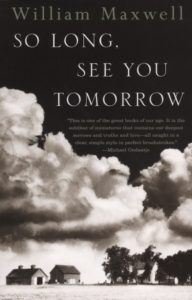Maxwell, William. So Long, See You Tomorrow
Random House, 1980
ISBN 0–679–76720–7
I very much doubt that I would have remembered for more than fifty years the murder of a tenant farmer I never laid eyes on if (1) the murderer hadn’t been the father of somebody I knew, and (2) I hadn’t later on done something I was ashamed of afterward. This memoir—if that’s the right name for it—is a roundabout, futile way of making amends. (p. 6)
 Sometimes our greatest regret isn’t something we did, but something we didn’t do.
Sometimes our greatest regret isn’t something we did, but something we didn’t do.
In this short—only 135 pages—gem of a novel, Maxwell’s first-person narrator ponders “the moment that has troubled me all these years” (p. 55). In considering “What strange and unlikely things are washed up on the shore of time” (p. 16), he meditates on the nature of time and memory:
What we or at any rate what I, refer to confidently as memory—meaning a moment, a scene, a fact that has been subjected to a fixative and thereby rescued from oblivion—is really a form of storytelling that goes on continually in the mind and often changes with the telling. Too many conflicting emotional interests are involved for life ever to be wholly acceptable, and possibly it is the work of the storyteller to rearrange things so that they conform to this end. In any case, in talking about the past we lie with every breath we draw. (p. 27)
The moment that haunts him is failing to acknowledge Cletus Smith, son of the murderer, when the two of them crossed paths a year and a half after the murder and its ensuing scandal. By then both the narrator’s family and Cletus and his mother had moved from the country into Chicago, where the boys’ attended the same high school. When the two boys passed each other in a school hallway, each recognized yet failed to acknowledge the other.
For the narrator, “the elderly man I am now” (p. 51) can seek atonement only in imagination:
Why didn’t I speak to him? I guess because I was so surprised. And because I didn’t know what to say. I didn’t know what was polite in the circumstances. I couldn’t say I’m sorry about the murder and all that, could I? … I think now—I think if I had turned and walked along beside him and not said anything, it might have been the right thing to do. But that’s what I think now. It has taken me all these years even to imagine doing that, and I had a math class on the second floor, clear at the other end of the building, and there was just barely time to get there before the bell rang. (p. 51)
We can forgive his rationalization, since “There is a limit, surely, to what one can demand of one’s adolescent self” (p. 134). Yet the hindsight of old age produces at least a bit of guilt over the question of whether Cletus Smith was ever able to “lead his own life, undestroyed by what was not his doing” (p. 135).
© 2017 by Mary Daniels Brown
